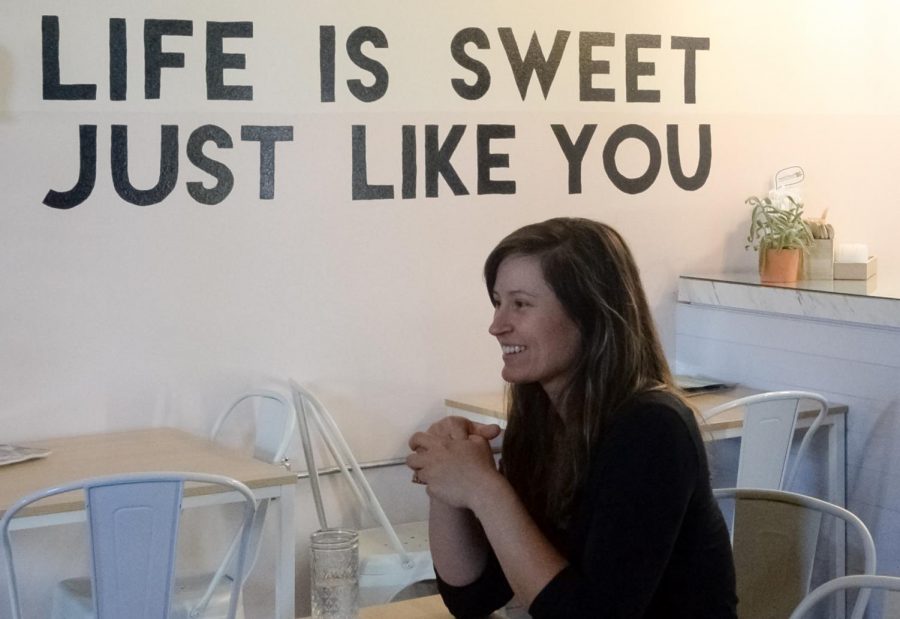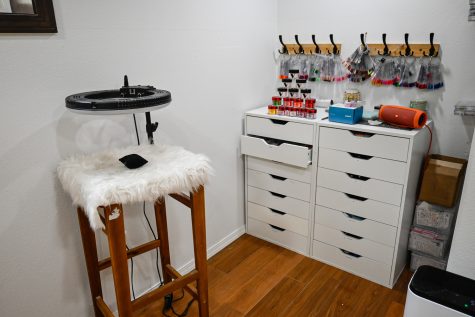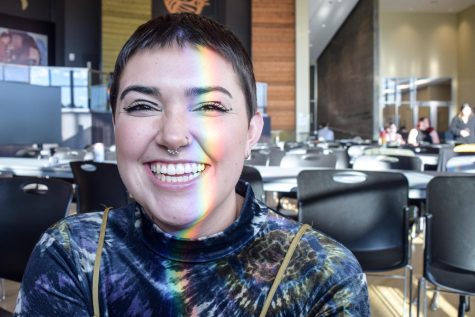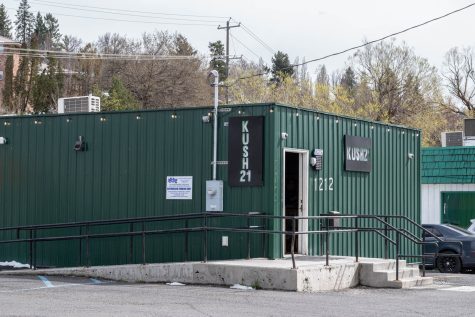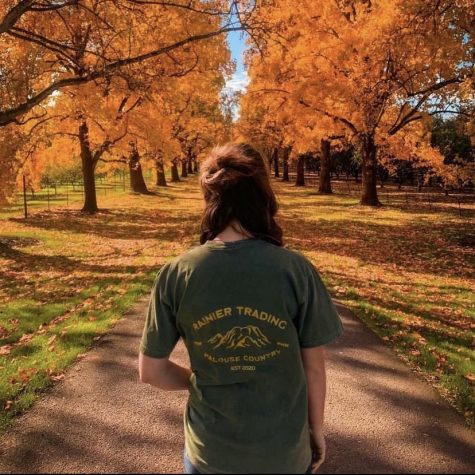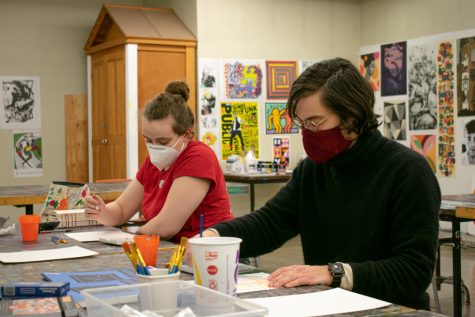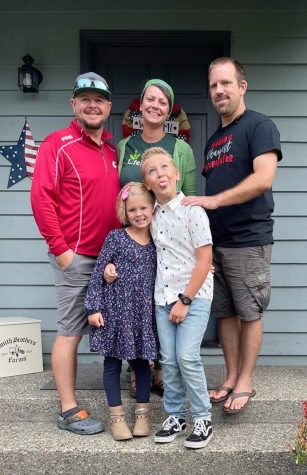Main Street Squeeze looks toward expansion
Owners want to get rid of stigma around vegan, gluten-free food
BELLA FLORES | THE DAILY EVERGREEN
Destiny Sternod, owner of Main Street Squeeze, talks about how and why she started her business.
August 29, 2018
September marks the one-year anniversary of the opening of Pullman’s first-ever juice and smoothie bar, Main Street Squeeze. This all-vegan and gluten-free establishment may still be in its infancy, but it’s already set to expand.
Co-owners Destiny Sternod and Jason Vanworkum are a husband and wife duo in their mid-20s, both dedicated to vegan lifestyles. Right now they’re on the hunt for a larger downtown location for their business.
Sternod said they have outgrown their roles in the corner of Sanctuary Yoga. She hopes to relocate their health food haven very soon — by next semester.
“I understood from my time as a student in Pullman how difficult it was to get healthy food,” Sternod, a WSU alumna, said. “There wasn’t a space serving that need for healthy food, already made, but not insanely expensive.”
Sternod and Vanworkum used their savings to revamp the former closet into Main Street Squeeze. Now, less than a year later, they’re looking for a new space to renovate.
Main Street Squeeze now offers waffles, toasts, smoothie bowls and featured snacks, all made with simple plant-based ingredients. As advertised on the juice bar’s Instagram page, menu items are always vegan, gluten-free, soy-free and “sweetened with only the nectar of dates.”
Vanworkum said they try to use recipes that allow people with diet restrictions to eat anything on the menu.
“We want a place for people to come where they don’t have to be picky or bug people about ingredients,” Vanworkum said. “People with food sensitivities and allergies don’t have to worry here.”
In addition to being non-allergenic, most of the shop’s food is locally grown. Some of their vegetables come from the couple’s own garden.
Because they are catering to a college crowd, Sternod said she prices their products to be as affordable as possible.
“I always want to have a menu item that’s less than $5,” Sternod said. “I believe in people having access to that.”
But flavor comes first for them, and she said their food isn’t just for vegans.
“My focus will always be how good something tastes before how healthy it is,” Sternod said. “I never want people to feel deterred just because they aren’t vegan.”
For a newcomer, she suggests their under-$5 sweetie pie smoothie, which is a blend of banana, strawberry, coconut milk and dates.
They hope their tasty vegan food and drinks can be eye-opening, Vanworkum said.
“When people are turned off by health food or vegan food, we’re giving them insight,” Vanworkum said. “It’s not just gross, plain, tasteless tofu. That’s not what vegan food is.”
Sternod and Vanworkum would know, because they’ve been leading a vegan lifestyle together for about eight years. The two had been vegetarian for years when they met in high school.
Vanworkum said. “It’s not just gross, plain, tasteless tofu. That’s not what vegan food is.”
Sternod and Vanworkum would know, because they’ve been leading a vegan lifestyle together for about eight years. The two had been vegetarian for years when they met in high school.
Though they were born and raised in the same small farming town around Tacoma, WA, their journeys to veganism were very different.
In their hometown, Sternod’s WSU alumni grandfather owned a pharmacy, and her father raised cattle.
“I was an only child, and my animals were my best friends,” Sternod said. “Even though I was around it all the time, I really didn’t make the connection until my dad had to slaughter one of my favorite cows. His name was Red and he was my best friend.”
Sternod said at that point she became interested in vegetarianism as a moral pursuit, and her interest in health and wellness continued to grow. Working at her grandfather’s pharmacy in high school, she decided to go into medicine. She also gained appreciation for a healthy diet.
“It’s life-changing when you’re able to provide something to someone who needs it,” Sternod said. “But there are downsides with pharmaceuticals. When I started to see a lot of issues in modern medicine, [people] going straight for the pills, that’s when I started looking into nutrition.”
In the meantime, Vanworkum said he was developing an interest in vegetarianism through music.
“Before I was vegetarian, I never thought about what I put into my body,” he said. “The thing that pushed me to question that was music.”
Vanworkum’s love for politically-charged punk and hardcore music led him to the “straightedge scene.”
“It’s a movement about being sober, clean and not doing drugs or alcohol,” he said. “A lot of people in that scene are into vegetarianism as well.”
After joining forces as a vegan couple, the pair moved to Pullman so Sternod could pursue a pre-medicine education at WSU. After receiving a bachelor of science in biology, Sternod said she was disappointed by what medical schools emphasized in their classes.
“The best I could find was one university that requires four hours of nutrition out of the hundreds of credits you take in medical school,” Sternod said.
So Sternod decided to take a break from school. At Sanctuary Yoga, she taught yoga classes, trained budding yoga teachers and became the manager. After a couple of years, Sanctuary owner Judy Kolde allowed Sternod to rent an area that was nothing but storage space at the time.
Right now, Sternod is busy working 80- to 90-hour weeks, and Vanworkum is balancing a full-time job at Schweitzer Engineering Laboratories with part-time work at Main Street Squeeze.
She said this “human sanctuary” could hopefully incorporate a farm where agricultural animals could live happily.
“My end goal, whether or not I’m a physician, is to own sort of a retreat rehabilitation center for patients, focusing more on nutrition, also having allopathic [western medicine] and naturopathic [alternative medicine] aspects combined,” Sternod said. “I think there’s a lot of value in merging them.”


